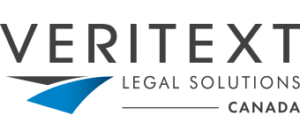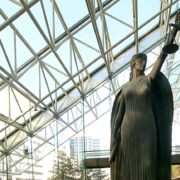Connect Series: Meet Systems & E-Trials Director Brandan Berry

Brandan is an IT professional with over 10 years of experience. After working with Reportex on a contract basis, he joined our team full-time to assist with our expansion into e-trials and other technologies.
Brandan successfully developed and implemented a fully supported e-trial platform for a paperless trial of over 150 days (with no down days caused by tech failures). He was also integral in facilitating the virtual attendance of a realtime court reporter into an onsite trial in a BC courtroom.
When Brandan isn’t staying on top of the latest tech or building computers, you can find him downhill mountain biking in the BC wilderness.
You were the guy when it came to facilitating and building the platform for the recent Saik’uz e‑trial. What are you most proud of about building the e-trial platform?
If I had to choose one thing in particular that allowed everything else to succeed, it would be the reliability of the entire system. With 151 days in a row without any downtime caused by the e‑trial system, it allowed our technician to be successful in their job every day; it allowed the plaintiffs and defence to argue their cases without breaking their flow and affecting their impact; and it allowed a judge who was hesitant to use technology to be introduced to and thrive with the e‑trial system.
The e-trial system itself was reliable as it worked with or without internet, so if the internet went down, the trial could continue. All data had an onsite and offsite encrypted backup, with per-file versioning rollbacks, if needed, so the chance of losing data was little to none.
We even ensured cross-technician training so that no matter which technician was sitting in the chair, they were up to speed on all the trial requirements and preferences.
E-trials are the way of the future; however, many feel nervous about depending on technology. What do you feel will be the most helpful resource we offer for our clients if they are looking to book an e‑trial?
Confidence. Educating clients that continuing to go with paper solutions is actually less effective than moving to digital solutions and that overall costs in time and resources differ significantly.
For example, imagine you have to create a rush order on an exhibit that you want to enter in the next day, but it is a 200‑page document that needs to be provided to five parties and the court, and you also need a copy to enter as an exhibit.
Paper: You now have to print 7 times 200 pages of the PDF in question, binder them, label them and then transport them to court, all while paying staff to get this completed overnight. All of this results in a ton of costs.
Digital: You upload the PDF to your private e-trial folder and then notify the technician via email that you have a new exhibit that will be entered the next day. The technician takes it and provides it to a central encrypted area, where all parties and the court automatically download a copy of it. You get home on time, you do not have to pay staff to work through the night to prepare binders and you do not need to lug said binders to court the following morning.
If you have the confidence to leave paper behind, your results will be money savings.
Throwing a pandemic into the mix while facilitating an e‑trial did not make the job any easier. What was the biggest challenge you had to overcome?
I had to incorporate — very quickly — a solution to allow witnesses and our realtime reporter to connect remotely due to limits on the number of people allowed in the courtroom. Fortunately, because the e‑trial system is so flexible, I was able to come up with, test and implement a solution within a couple days of a solution being needed.
At Reportex our core values of team, mentorship, equality, community and industry are central to what we do. Which of these values resonates most strongly with you and why?
I would say that all of these values play a part, but if I had to choose the ones that stand out the most, they would be “team” and “industry.” Without my technicians there is no way this would have been possible, and we challenged the industry and proved that going digital instead of paper is not only possible but incredibly effective.
We have been talking a bit about wellness on the blog and through our Slack channels. Do you have a favourite way to recharge or any tips for staying well?
You would think that after a day of fixing and working with tech, I would choose to do anything else, but I see tech in different categories. So learning about new tech and playing around with new demo applications is actually a great way for me to turn off my brain. I also like building or survival video games — something that I can immerse myself into while talking with all my friends from around the world. Using these other tech-careered friends as sounding boards is also a great way to help solve problems that I’m struggling with or even just allow me to look at an issue a different way.
I do of course make sure I get away from the tech and take my dog for hikes in the forest or throw myself down a mountainside on my bike when I need that blood-pumping adrenaline with my wife‑to‑be.
As for advice I would say if you do not have someone you can talk to either in person or online, find one. Play an online game with some people. Party up with someone for the day and just have a blast, talk about anything, crack jokes and let loose a bit. The amount of stress you can release and the overall good feels you can get from these interactions are more than enough to keep you sane in these times. And who knows — you might find someone really fun to be around (even if it’s over the internet). Try to be social but be safe doing it.






